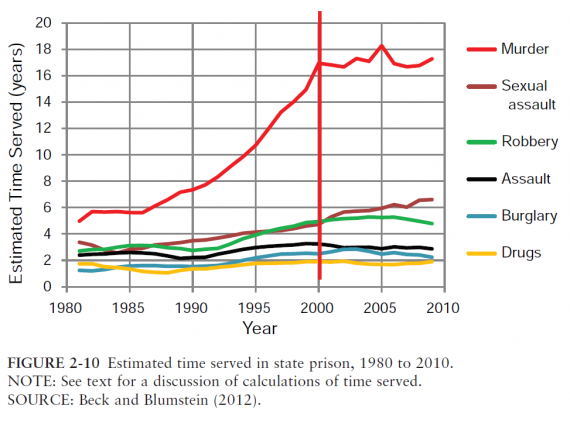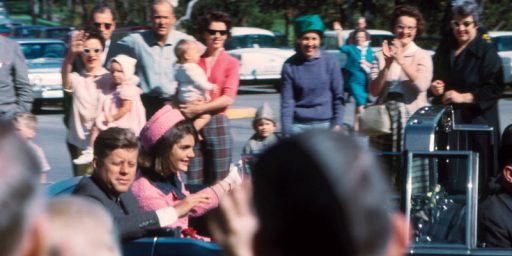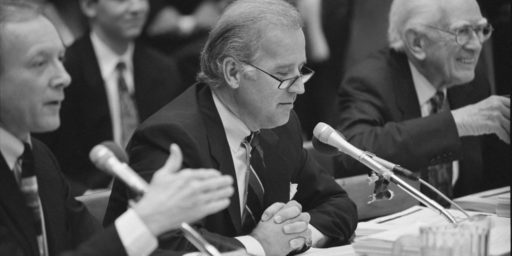The Prison-Industrial Complex
The problem goes beyond the War on Drugs.
Will Wilkinson follows up on some recent comments by President Obama on the need for criminal justice reform.
To really roll back the prison-industrial complex, it is necessary to reduce sentences for violent criminals at the state level, too. That’s a tougher sell. It involves not only considering its racial inequities and costly bloat, but also the moral failures of a system that doles out punishments that are out of proportion with their crimes.
To weigh the merits and morality of America’s incarceration rate, it helps to remember why it started booming. It began in the 1980s, when high crime led district attorneys to send more people to prison, and for longer sentences. The country’s “war on drugs” introduced strict sentencing guidelines, which reduced the discretion of judges and parole boards. In their 2013 study “Why are so many Americans in prison?“, Steven Raphael and Michael Stoll, professors of public policy at Berkeley and UCLA, found that changes in sentences for drug offences were important, accounting for about 20% of the increase in the incarceration rate. However, harsher sentences for violent criminals accounted for nearly half the rise. Between 1984 and 2009, the time typically served in state prisons increased by roughly five years for murder, three years for sexual assault, eighteen months for robbery and six months for burglary. A significant reduction in the incarceration rate will require rolling back prison terms for these crimes, too.
That’s an important point: while the so-called War on Drugs is a major culprit, it’s neither the only nor the most significant one. We’ve simply made a decision as a society over the last 30 years to treat offenders much more harshly. Here’s a graphical representation of the trendlines:
Until a decade or so ago, I strongly concurred in the decision. Alas, as Wilkinson points out, most of the arguments and impulses that led us there have little basis in fact:
Defenders of harsh sentences claim that they both deter crime and prevent it by keeping many criminals off the streets. The evidence for deterrence is weak. A 2014 report on incarceration from the National Academy of Sciences explains that criminals are deterred primarily by the risk of getting caught; longer sentences have had no discernible effect. Longer prison terms affect crime rates mainly through the “incapacitation effect”, which keeps those most prone to crime locked up. However, as Messrs Raphael and Stoll explain in a paper for the Brookings Institution, the incapacitation effect peters out considerably as the incarceration rate rises. The worst criminals tend to get locked up even in much more lenient regimes. Locking away large numbers of less dangerous people for long periods delivers very little in additional public safety. Given how high America’s incarceration rate is, it is fair to say reducing it won’t precipitate a crime wave. Many convicts serving long sentences were never generally dangerous, or have mellowed with age, and no longer pose a threat to the public.
Messrs Raphael and Stoll point to the recent example of California. A court decision declaring prison-overcrowding unconstitutional led the state in 2011 to pass reforms that ended the practice of sending convicts back to prison for technical parole violations. The result was that some 20,000 convicts who otherwise would have been sent to prison remained free. The state incarceration rate reverted to 1990s levels without an attending rise. Indeed, studies found no effect on violent crime and a small effect on property crime. (Each year of prison not served due to California’s reform was estimated to cause an additional 1.2 auto thefts.) However, the social cost of a stolen Corolla is not clearly greater than the cost to taxpayers of a year of prison time. “[H]arshness in sentencing often results in prison spells that cannot be justified by the risk posed by the offender,” Messrs Raphael and Stoll observe.
Wilkinson’s academic training is in philosophy, so he goes there, too:
Harsh sentences may not do much to ensure safer streets, but maybe criminals deserve them. Plenty of people think that America’s incarceration rate reflects the justice of retribution. But this theory has some holes, too. To lock someone in a cage is to strip him of all liberty. Most of us think this sort of total deprivation of freedom can be justified when a crime is serious enough. And most of us think that very serious crimes can justify very long spells of captivity. A rule of proportionality applies. Punishment must fit the crime. Keeping people in jail too long adds a new injustice to the original crime. If someone commits a crime that merits five years in prison, but is kept in captivity for ten, then five years of his or her life have been unjustly stolen in much the same way that the life of a kidnapping victim, locked away for five years in a basement, has been stolen. It’s a horrible injustice either way.
So what are we to make of the leap in time typically served for violent crimes between 1984 and 2009? Either we were unjustly lenient then, or we are unjustly punitive now. Did we only lately wake up to the real gravity of murder, or are we now overreacting?
The fact that America’s previous practices were more in line with those of the rest of the civilised world today ought to lead us to suspect that America is now punishing its violent criminals too harshly. America’s prisons may therefore be teeming with many thousands of people who have already served sentences equal to their crimes, yet remain in captivity, deprived of their liberties and rights, like kidnapping victims or slaves.
“But they’re violent criminals!” you say. “Rapists and murders!” Indeed, many are. And they have been, and are being, duly punished for their crimes. Those who have served a proportional sentence, and have proven themselves worthy, deserve to be restored to public life.
Tough-on-crime types are likely to rebut this sort of position with arguments about deterrence and public safety. And it’s true that keeping people in prison too long prevents a little crime, though not much. However, deterring crime by keeping people in prison too long is equivalent, from a logical and moral point of view, to rounding up ex-cons who have already served their time and throwing them back in the clink for a while, even if they’ve committed no new crimes, simply because some of them eventually will. We wouldn’t stomach this kind of pre-emptive incapacitation. So Americans shouldn’t be willing to tolerate it when it involves keeping people in prison after they deserve to be released.
But, of course, we’re a society that no only tolerates but jokes about prison rape. It’s very difficult, indeed, to see the issue of prison injustice getting much sympathy, even with President Obama in full Honey Badger mode.*
Interestingly, though, the president is getting some support across the aisle for at least modest reforms:
Mr Obama is starting small, calling for increased judicial discretion for non-violent drug offenders. John Boehner, the Republican Speaker of the House, has indicated his support for reforming federal sentences for non-violent drug crimes, which means something might actually get done.
Not that Boehner’s support makes this a done deal, of course, especially in an election year. Certainly, it’s a risky issue to take on in a nomination fight with sixteen candidates. Still, it’s an interesting issue and one that’s consistent with conservative principles. Not only would radically reducing the number of crimes for which we incarcerate people and reducing the sentences for all but the most heinous crimes be fiscally responsible but it would also radically reduce the power of government.
_______________
*Many of the president’s friends and foes alike have noted in recent weeks that he’s been using his lame duck status in the opposite way that most of his predecessors did, seeing it as freeing him to speak his mind and take actions that he might have eschewed earlier in his presidency. The naming on this phenomenon refers to a viral internet video of a few years back.








This is why I favor a single six-year term for our presidents (not that it will ever happen). When the president can govern instead of worrying about his/her own reelection, then they are free to deliver on whatever mandate they have been given.
Congressional elections will continue to serve nicely as a dampening effect.
The murder rate is tied to the war on drugs. We have had a spike in the gang related number of shootings and murders here in the progressive paradise of the Portland metro area, white, black, Hispanic and Asian. This is related to the societal problem of chronic youth unemployment and also the war on drugs. When you have no way to make a living you often resort to selling drugs. This phenomenon is not unique to cities but has also been observed in rural Appalachia.
That said the lobbyists for both the for profit prisons and yes, the prison guard unions have been pushing for mandatory minimum sentences and 3 strikes and your out.
How can you write an article on sentencing reform and the prison-industrial complex without once using the word ‘black’? Wilkinson mentions generic “racial inequities” in passing, then ignores them for the rest of his discussion. None of the other writers quoted, nor the author of this article, mention the issue at all.
As with the death penalty, the case against long sentences is entirely dominated by the extreme historical bias in who gets them. We can worry about how long a sentence is appropriate for which crime AFTER we’ve fixed the problem of some convicts being more equal than others.
@Tony W: A president is restrained not only by his own re-election efforts, but also by those of the House and Senate. His restraint between ’12 and ’14 are the direct result of that. He has no more elections of any kind to worry about now.
If there is one thing we have learned about Obama, James, it is that he plays the long game. He is smart enough to know there will be no progress on this problem by January 2017. He is just setting the table for his successor.
The big fly in the ointment here is the privatization of something that should be within the sole providence of gov’t. Prisons are now ‘jobs programs’ and ‘profit centers’. Making money off the deprivation of a persons freedom is absolutely morally abhorrent. Something I thought we all had settled as an issue back in 1865.
I guess not.
First, the analogy of Barack Obama to the honey badger video was worth the price of admission many times over.
Second, the lengthy part of the Wilkinson article (for which another thank you) was his contending that there is a proportionality between the seriousness of a crime and what the sentence “should” be. Longer sentences, he says, are akin to kidnapping.
I don’t see how that actually works down where the rubber meets the road. Someone who steals my car has committed a crime that is — in my own little part of the world — much worse than (say) Dylann Roof committed.
Mr Wilkinson’s proportionality idea depends on an objective standard and/or a completely disinterested and objective judge. Both are rarer than unicorns IMHO.
I’d suggest that the philosophical approach to use would be Bentham’s Utilitarian approach. There would be some point along the continuum between very light and very severe sentences at which further incarceration becomes more of a burden on the state (including the prisoner and his family as well as the victim & family) than setting him free with the potential to commit more crimes.
As noted above, various interests (the prison-industrial-complex, guard’s unions) have their thumb on that scale. But in the actual conduct of passing and enforcing laws the give and take to find the ‘sweet spot’ on that continuum in legislatures and courtrooms is more reasonable that thinking deeply about how severe a sentence ‘should’ be in some celestial scale of justice or listening to some oracle for wisdom.
edit: “to the prisoner and HIS family” — altho probably 95% true, probably should have been gender-neutral.
I am not in favor of prison for non violent crimes: shoplifting, pick pockets, traffic violations, unpaid fines, simple possession of illegal drugs, tax violations, and crimes that do not involve injury, violence, or guns. These violations can be paid with a fine or some sort of community service.This would empty a lot of cells. I am however in favor of prison terms for violent crimes: bank holdups, kidnapping, arson, terrorist plots and actions, rioters, gang members, serious assault and battery, plots of mass destruction. These crimes especially should carry long throw away the key prison terms: sex offenses on children, murder, bombings, serial killers, bank holdups, attacks on the White House, and gun running.
The last thing the American people want is a bunch of violent criminals let loose to roam freely looking for more innocent victims. We have had enough of the crime and unsafe streets in this country. We don’t need soft on crime judges letting career criminals out with a slap on the wrist; often times on the streets before their poor victims are out of the hospital ! (If they are that lucky)
If this Mr. Wilkinson wants some of these people released, maybe he can put them up at his house. Not in our town or neighborhood ! “Why are so many Americans in prison ?” Because so many people are violent criminals ! To be sure, a few are there unjustly. A few turn themselves around. But a lot don’t. That is why there are so many repeat, career criminals. Just look at all the serial killers ! They can’t stop. Who wants them roaming around loose ? I am afraid that some people are in a serious state of delusion or have been in ivory towers too long. These social psychologists, judges and others who want these violent criminals turned loose kn society usually are the very ones who live behind the walls of gated communities and are armed to the hilt, while the rest of us have to fend for ourselves.
“He will keep on killing” Dr. Will Graham (“Red Dragon”)
@OzarkHillbilly:
That. For profit prisons and guard unions have lobbyists. Prisoners and potential prisoners do not. (OK, there are advocacy groups, but it’s a matter of degree.) It puts perverse incentives in the system. Just one more example of how money in politics is screwing up the country, I’d also bet that there are vendor and contractor lobbyists supporting the war on drugs.
James, that was a very good piece, and thank you for it. Our sentencing laws are in many cases as repugnant as the crimes they purport to punish.
@DrDaveT is right, the harshness of US sentencing laws is undoubtedly a function of “our” belief that crime is “theirs.” It is effectively white people locking up black and brown people. Anyone who doubts that has only to look at the sentencing gap between “white” cocaine and “black” crack. And it’s the white establishment that is profiting from locking up black and brown people.
Deterrence has never worked very well. In 18th century Britain you could be hanged for just about anything, and yet there was crime.
1) End the drug war. This is not just about reducing numbers of prisoners today, it’s a matter of eliminating a parallel economy that fosters a culture of criminality almost from birth.
2) Don’t let voters set sentences – and I’m referring here to my own state’s horrific three-strikes law, since somewhat watered down. A terrible black mark on California’s honor.
3) Draw sharp, clear distinctions between violent and non-violent crime. I don’t give much of a damn if my car is stolen. I care about the safety of my wife and children. Steal my car? Do six months or a year. Hurt my kids? You can die in a hole.
4) Take profit out of the system altogether. Put an end to private prisons.
Americans are not subtle people, we are people who reach for the hammer no matter what the problem. We insist that bombs, guns, and prison bars are the answer for complex foreign and domestic issues, and that instinct quite often leads us astray.
@michael reynolds:
A reform that everyone should be in favor of is to make law enforcement and the judicial system more responsible for their own decisions. If judges state that they believe someone is not a danger to others, then they should have to pay if they are wrong. Establishment some level of liability for law enforcement and the judicial system to protect citizens from law breakers and then we can do away with minimum sentences or alterantive justice. If the alternative justice (fines and community services) are really effective at detering criminals, then there will be no problem. However, if lower sentences and putting fewer criminals into prison leads to higher crime rates, then those responsible should have to pay. Put law enforcement and the judicial system into the same legal position as doctors, hazard waste treatment companies, or the airlines.
@DrDaveT: @michael reynolds: Criminals have increasingly become “them” and the fact that criminals are disproportionately black (and Hispanic) has contributed to that. But note that we’ve also ratcheted up penalties for even minor driving offenses over the same period. And the “three strikes” thing isn’t mostly about race, either.
@superdestroyer:
Which, of course, would further the incentive to lock people up for no apparent reason on the off chance that they’d commit another crime just as they’ve led to a plethora of absurdly expensive, generally unnecessary medical tests and security kabuki in airports as CYA measures.
I struggle with these issues. I am pretty strictly a utilitarian. The idea that retributive justice is its own good has never made sense to me. I got into a major argument with some co-workers (accusing of me of being a big liberal, as always, which y’all maybe know I’m not). I work in this field so these questions are definitely on the forefront of my mind.
There was a recent case here in Florida where a woman caused a DUI and killed two young women. She was herself very young, and had tweeted out before the accident “2 drunk 2 care” and of course subsequently caused the accident. I guess under the common law, with that tweet, that could be a pretty easy case of depraved heart murder. She got something like 45 years. I am torn about sentences like this. True, those two other young women don’t get to live even a single extra day because of the offender’s actions. If one were my daughter or sister, would I feel so merciful? I don’t know – but is the victim’s feelings what our system is about? Most would say no – it’s about the wrong of defying the State and its conventions for behavior. But what good does it serve society to put a 21/22 year old offender in jail for 45 years? It’s purely for punishment. Wouldn’t society be better served if this woman could spend a few years thinking about the horrible act she caused, then be able to get out and become a taxpayer and just maybe a contributing member of society. Don’t get me wrong, a prison sentence is appropriate, but come on, I drove drunk a few times when I was her age. I suspect many of us did. That doesn’t make it right or her act excusable, but it suggests to me that while the outcome of her actions was different, this girl is no more beyond redemption than many of us who grew out of this behavior. And why shouldn’t our system offer a path back to the stars, rather than just a path into the pit?
I haven’t quite figured it out, and I doubt we could replicate, say, the Norwegian system on such a vast scale, but I would like to see a system where we really separate out the hardened, unrepentant violent criminals from the young and the dumb and the situational and find a way to force those people to both pay a price for their crimes while also forcing them to go back into society and contribute, and hopefully turn their lives around. And a lot of times you will need tools to do that. Better job training, maybe pushing more of these “drop the box” campaigns for non-violent and non-sexual felonies. I get the struggle a lot of these criminals face. I’ve mentioned before I grew up in a troubled home without any money. All but one of my close high school friends now have records, one has been in prison for years. I got lucky because my Uncle Sam and a few other folks cared about me and I had enough of my own sense to want something better. But how many folks in our prisons did something stupid when they were young, that they could be rehabilitated from? I will tell you from experience you don’t understand how angry being poor makes you towards the world unless you’ve been there. I know I was angry – powerless, can’t do anything you want, dependent on people for basic things like transportation, eating horrible food, just miserable. It makes you angry, an for a lot of folks it by necessity changes their moral calculations. Wealthy folks don’t understand that feeling, and thus don’t understand why the cycle keeps repeating itself.
@michael reynolds: I agree with your entire post, although I’ll confess to taking theft a little more personally. Had some stuff stolen out of a rental car in downtown Detroit in March. It’s probably a little less replaceable for me than you right now too. Fortunately my better judgment prevailed and rather than rage I just went to the police station and filed a useless report with some very helpful Detroit Police. First thing they said in response to my reporting of the crime? – “Well welcome to Detroit Michigan!” Can’t imagine the tourist development council there appreciates that, but I thought it was funny.
I agree there’s a problem but I don’t have a quick, easy solution at hand for it. I have some sympathy for the point of view, expressed above, that regulatory infractions don’t deserve jail time. However, if carried through, that would result in an increase in the present trend for there to be one law for the rich and another for the poor. As Anatole France said more than a century ago, “The law, in its majestic equality, forbids the rich as well as the poor to sleep under bridges, to beg in the streets, and to steal bread.” Should we then abandon jail time for all violations in a return to the old gothic system, i.e. kill somebody, pay a fine? Doesn’t seem like a solution.
Race is certainly a contributing factor to the discrepancies in incarceration rate as is poverty but they’re not the only factors. For example, the FBI reports that the homicide rate among rural whites and rural blacks, adjusted for income, is about the same. Clearly, there is a problem in our cities and IMO the problem is gangs and the factors that make gangs ways of life. IMO drugs are merely opportunistic in that. The real problem is greater social dysfunction.
@OzarkHillbilly:
Ya – that was the ‘dampening effect’ to which I referred 🙂
@Tyrell: I for the most part agree with you. We as a society must recognize that we are putting people in prison who don’t belong there but at the same time some people a too broken to be fixed and should be filed away.
I imagine I’m one of the few people here who has ever faced hard time. Had I gone to prison at age 24 I would have emerged a dangerous young man. Instead I avoided prison and within a few months met my wife and completely turned my life around. Since then I’ve cost the system zero dollars and have certainly paid more than 5 million in state and federal taxes.
Not everyone who gets involved in non-violent crime is salvageable, but if you look at Tim Allen (Tool Time) who went in for dealing, or fellow kidlit author Jack Gantos, also in for dealing, or me the ex-thief, you’ve got three examples of people who did complete 180’s. I have to assume there are quite a few more who either did time or avoided doing time who went on to be model citizens.
The goal with non-violent crimes should be to divert that person away from further criminal activity. This does not mean just releasing them back into their natural environment, or sending them to the loving arms of the gangs that actually run our prisons. Use house arrest, fines, community service, compulsory classes, therapy, all that stuff the tough-on-crime folks sneer at.
Off topic but seriously, can you fix your frontpage ads? They have been throwing Javascript alert popups at me (when using for two weeks now and redirecting me to some android malware-ish download page, making it impossible to even view the OTB frontpage. I’ve mailed your ads contact but no response…
@michael reynolds:
That plugs into something I’ve seen mentioned before: crime is a young man’s game. A huge percentage of “irredeemable thugs” can become reasonable citizens just by aging. We have a aging prison population of men who did violent things decades ago but aren’t really dangerous now. Biologically, we know that people get better at impulse control and thinking out consequences as they get older.
My steps to curb the prison population would have a lot of what’s mentioned above:
1) End the War on Drugs. This will also cut violent non-drug crime, just as ending prohibition did. And as long we’re up, end the War on Sex Work too.
2) Non-violent criminals should serve no sentences or light ones. Fine and community service are better options. Parole needs to be overhauled too. McArdle (yeah, boo hiss) wrote about Hawaii’s highly successful parole program which has slashed recidivism rates enormously by teaching (and allowing for) personal responsibility.
3) As prison populations fall, change the emphasis from punishment to rehab. Tough prisons sentences sound good but just make more violent criminals. If we can take in a dangerous man at 20 and parole him with better life skills at 30, that’s a win. At the same time, we can identify those that can’t be redeemed and keep them jailed for good.
I’m actually hopeful on this because a lot of the movement toward criminal justice reform is coming from the Right. Rick Perry passed a reform that cut Texas’ prison population by 20%. Oklahoma, Utah, Alabama, Kansas, Wyoming — are all on board and have cut their prison populations a little bit. To me, this is a conservative issue (and a liberal one as well). Imprisoning so many people is expensive, destroys families, wrecks communities and places people beyond redemption. It’s unAmerican.
@James Joyner:
Let’s be careful how we phrase that, James. “Who is a criminal?” is a chicken-and-egg question. (Economists would say that there is an identification problem due to endogeneity. This is why nobody listens to economists.)
A more careful phrasing:
Convicts are disproportionately non-white.
As a result, whites are increasingly less likely to know a convict than are non-whites.
For non-whites, convicts are becoming “the Other” faster than for non-whites.
Non-whites are already considered “the Other” by whites, and are increasingly identified with criminality in white minds.
I’m not ready to assert that “criminals are disproportionately black”; we don’t have good data on that. What we do have is data on convictions (which we all know are not unbiased with regard to race), on incarcerations (which we all know are not unbiased with regard to race), on sentence lengths (see above), and (by careful inference only) on relative frequencies of blue-collar vs. white-collar crime.
Personally, I think the people who took down our economy in 2008 committed a far worse (and more violent) crime than someone who bashed three tourists over the head and stole their wallets and smart phones. The fact that the finance types did it without bashing anyone over the head seems irrelevant to me, and I would love to see them sentenced accordingly.
@michael reynolds:
What about white collar crime? Non violent, but it does more damage than sticking someone up and robbing them of $80 or whatever they have in their wallet.
Yes, I know, our jails are not filled with white collar criminals, but they should be, and they are a case where your otherwise we’ll reasoned argument doesn’t work.
Prison is a deterrence. The punishment needs to be harsh enough to make it not worth risking getting caught. There are lots of things that should be decriminalized, and we should prioritize who we send to jail longest to get the people who cause the most damage, but theft, burglary, and other non-violent or low-violent crimes still need to have prison time.
@Tyrell: for once, I agree with you.
@Hal_10000:
Yeah, when you get down to cases it’s young men, age 16 to maybe 26. I don’t think I had a moral sense of any consequence until I was in my mid-20’s and it was fairly sketchy then. This is one of the more useful secondary effects of wars and colonies and crusades – you have a way to use young males that keeps them busy until they sober up. Or die.
You are right to add ending the Puritanical obsession with prostitution. That’s a tough charge for a woman to come back from. It’s not a nice business, but it’s made infinitely worse by driving it underground.
@Gustopher:
Well, we could start by applying fines that actually matter. A guy who steals a billion doesn’t care about your $50,000. Why not set fines as a proportion of income and wealth?
Also, don’t forget that just because there’s no prison sentence, there is still jail and all the other fun associated with being arrested. Handcuffs are an interesting moment. Mug shots. Cavity searches. Orange jumpsuits. Playing ‘meet the cellmates.’ I was in jail for 11 days awaiting bail and I may not be the swiftest guy in the world but I got the message: let’s not do this anymore.
@michael reynolds:
A guy who “steals a billion” isn’t going to spend 5 minutes in a jail cell Michael. His $5,000/hr lawyer will have him out before the cops can finish booking him.
@DrDaveT:
This, a thousand times this. I think back to Enron and all the people who lost everything due to Skilling’s, Fastow’s and Lay’s easy money greed. I’m talking employees who were on the cusp of retirement and bought the snake oil those 3 were selling. But then, I have a special hatred for rich people who think everyone else exists only to make them richer.
@Tyrell: Half the people in prison are there for completely non violent crimes…
A large chunk of the ones in there for violent crimes were originally put in prison for non violent crimes. Prison is a great place to learn how to be a professional criminal.
Once you have a criminal record involving prison time it’s really hard to make it legally. Good jobs don’t like to hire ex-cons.
@OzarkHillbilly:
That’s a Hollywood trope writers use to short-cut the boring stuff. In reality bail has to be set before it can be made, and in anything more serious than a traffic offense it is set by a judge in court. This is quick in some low-crime jurisdictions, but can take days in a city.
Also, any time you want someone to stay in jail you just need to arrest them on a Friday afternoon, or before any number of holidays. Spend a weekend in a drunk tank or a jail common room and tell me it didn’t make an impact.
When you see instant turn-arounds it’s because there’s a deal in place prior to surrender. That’s up to the DA. But a DA who means to get someone can perp-walk him right out of his office and into a holding cell on a Friday afternoon, and I don’t care who the lawyer is, the dude’s spending the weekend. Also, you have to use clean money to put up bail, and not everyone – even your bankster – has a hundred grand in cash and a house he can use as collateral. So more likely he’s in for Friday, Saturday, Sunday and Monday night. Tuesday he gets the cash and the collateral and makes bail.
@michael reynolds: All of that is true. No idea why someone would downvote that.